Strategic Change Management Report: GPDOCS Healthcare Practice
VerifiedAdded on 2023/01/16
|6
|1426
|86
Report
AI Summary
This report provides a comprehensive analysis of strategic change management within the context of GPDOCS, a healthcare practice facing changes in government policy and contracts. The report explores the critical role of leadership and change agents in navigating organizational adjustments, emphasizing the need for cost-effectiveness and service improvements. It delves into the attributes, characteristics, roles, and values of change agents, highlighting their significance in overcoming resistance to change, diagnosing current situations, and facilitating smooth transitions. The report also evaluates the advantages and disadvantages of employing external consultants as change agents, considering their fresh perspectives, specialized expertise, and potential costs. The findings underscore the importance of strategic planning, effective leadership, and the strategic use of change agents in adapting to the evolving healthcare landscape.
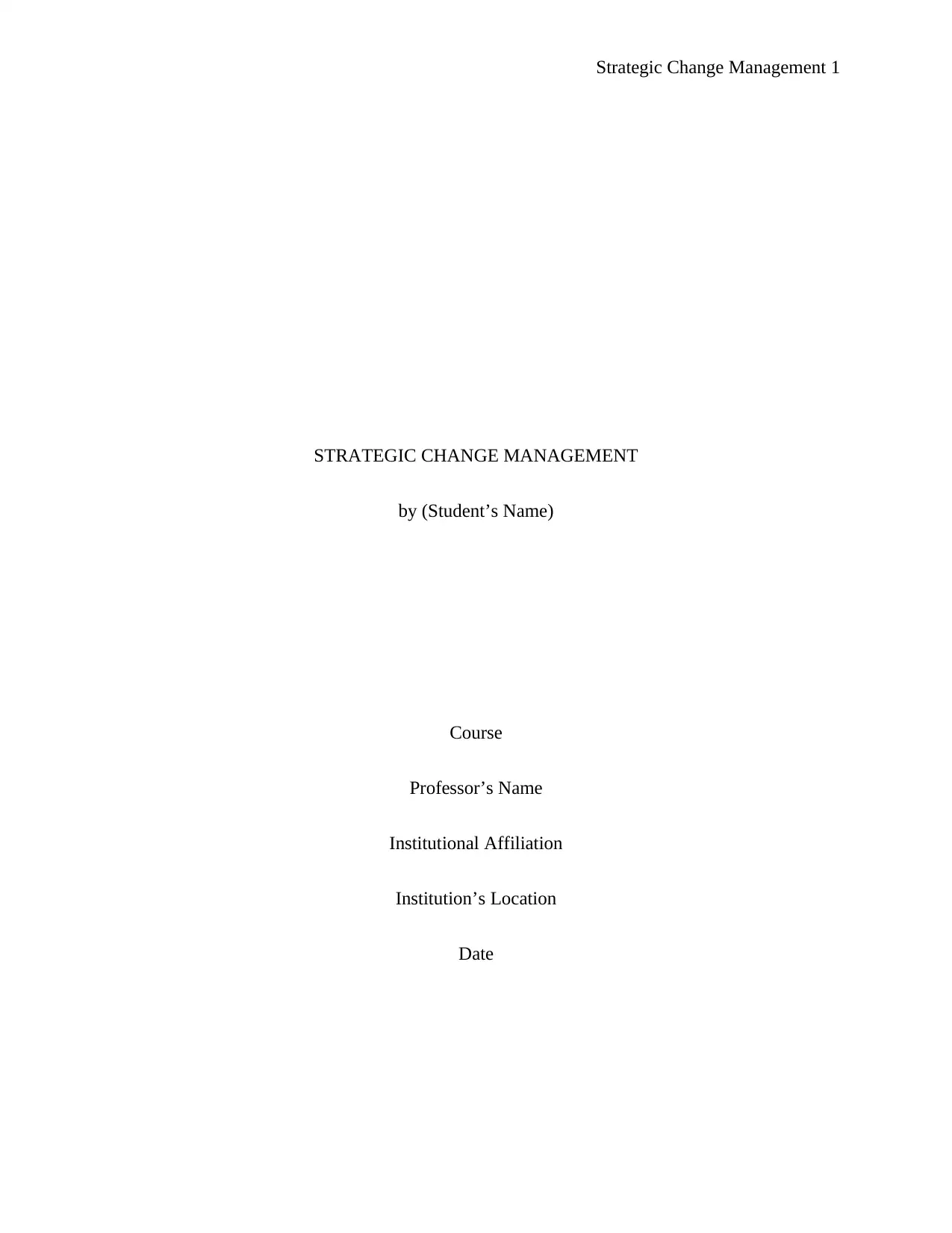
Strategic Change Management 1
STRATEGIC CHANGE MANAGEMENT
by (Student’s Name)
Course
Professor’s Name
Institutional Affiliation
Institution’s Location
Date
STRATEGIC CHANGE MANAGEMENT
by (Student’s Name)
Course
Professor’s Name
Institutional Affiliation
Institution’s Location
Date
Paraphrase This Document
Need a fresh take? Get an instant paraphrase of this document with our AI Paraphraser
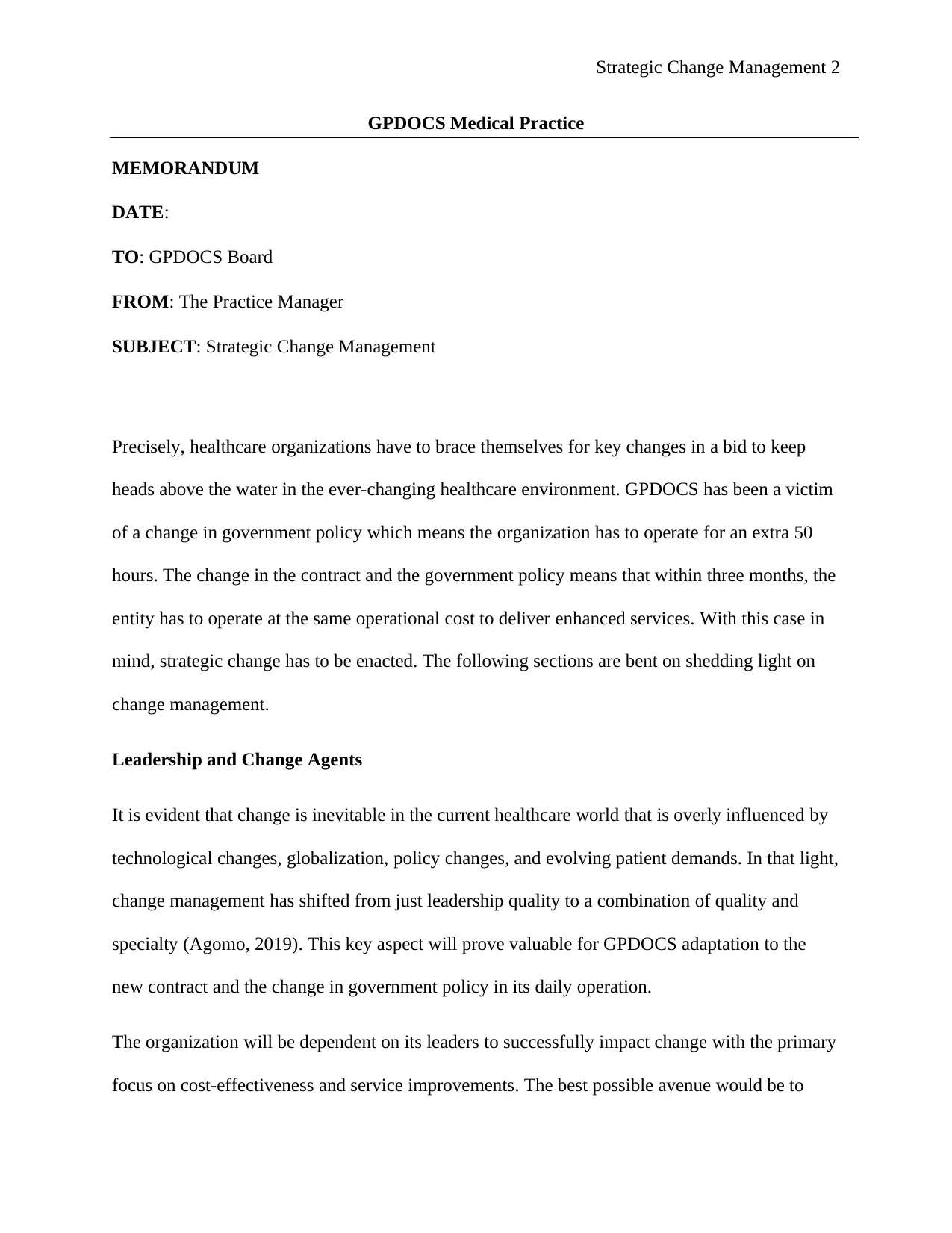
Strategic Change Management 2
GPDOCS Medical Practice
MEMORANDUM
DATE:
TO: GPDOCS Board
FROM: The Practice Manager
SUBJECT: Strategic Change Management
Precisely, healthcare organizations have to brace themselves for key changes in a bid to keep
heads above the water in the ever-changing healthcare environment. GPDOCS has been a victim
of a change in government policy which means the organization has to operate for an extra 50
hours. The change in the contract and the government policy means that within three months, the
entity has to operate at the same operational cost to deliver enhanced services. With this case in
mind, strategic change has to be enacted. The following sections are bent on shedding light on
change management.
Leadership and Change Agents
It is evident that change is inevitable in the current healthcare world that is overly influenced by
technological changes, globalization, policy changes, and evolving patient demands. In that light,
change management has shifted from just leadership quality to a combination of quality and
specialty (Agomo, 2019). This key aspect will prove valuable for GPDOCS adaptation to the
new contract and the change in government policy in its daily operation.
The organization will be dependent on its leaders to successfully impact change with the primary
focus on cost-effectiveness and service improvements. The best possible avenue would be to
GPDOCS Medical Practice
MEMORANDUM
DATE:
TO: GPDOCS Board
FROM: The Practice Manager
SUBJECT: Strategic Change Management
Precisely, healthcare organizations have to brace themselves for key changes in a bid to keep
heads above the water in the ever-changing healthcare environment. GPDOCS has been a victim
of a change in government policy which means the organization has to operate for an extra 50
hours. The change in the contract and the government policy means that within three months, the
entity has to operate at the same operational cost to deliver enhanced services. With this case in
mind, strategic change has to be enacted. The following sections are bent on shedding light on
change management.
Leadership and Change Agents
It is evident that change is inevitable in the current healthcare world that is overly influenced by
technological changes, globalization, policy changes, and evolving patient demands. In that light,
change management has shifted from just leadership quality to a combination of quality and
specialty (Agomo, 2019). This key aspect will prove valuable for GPDOCS adaptation to the
new contract and the change in government policy in its daily operation.
The organization will be dependent on its leaders to successfully impact change with the primary
focus on cost-effectiveness and service improvements. The best possible avenue would be to
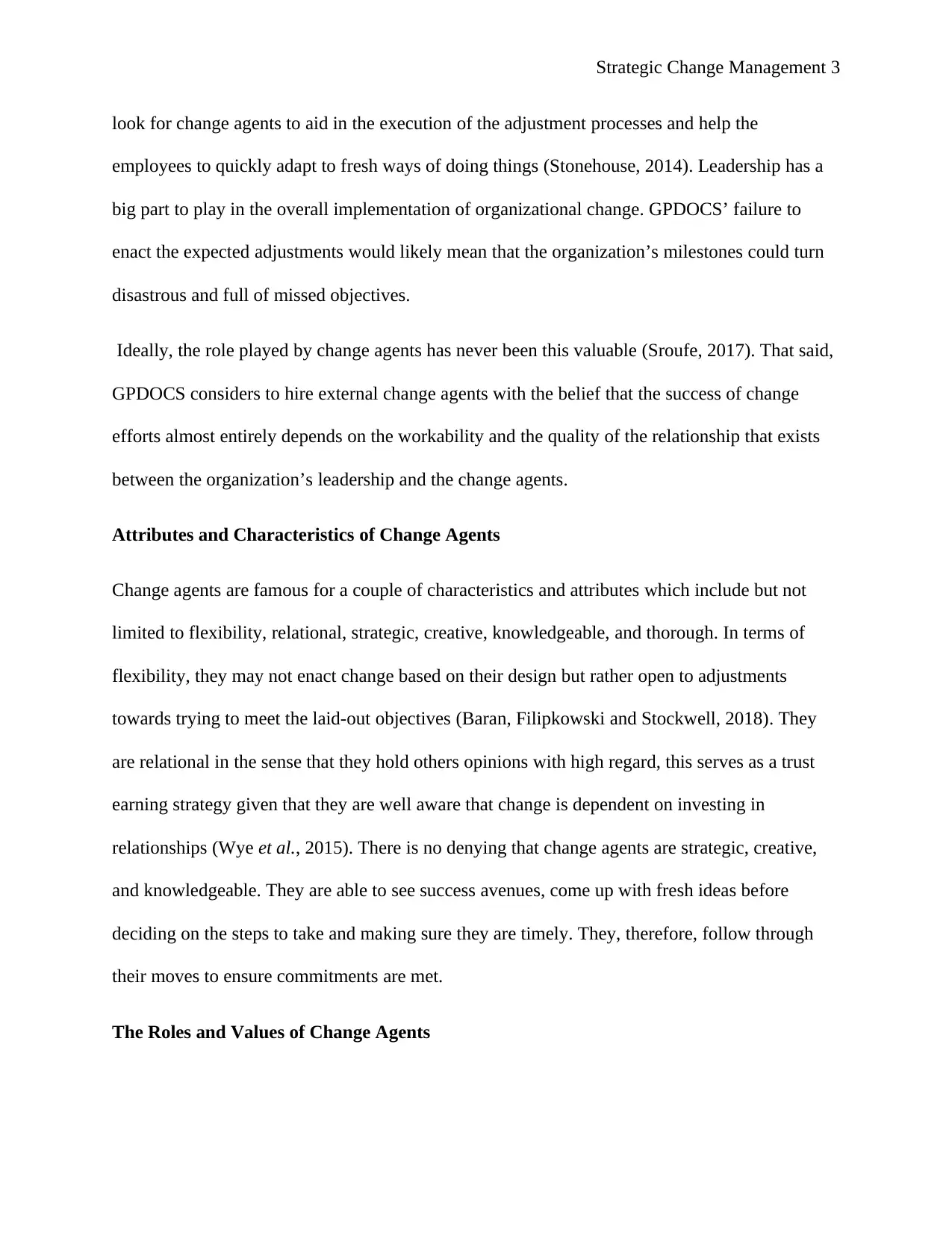
Strategic Change Management 3
look for change agents to aid in the execution of the adjustment processes and help the
employees to quickly adapt to fresh ways of doing things (Stonehouse, 2014). Leadership has a
big part to play in the overall implementation of organizational change. GPDOCS’ failure to
enact the expected adjustments would likely mean that the organization’s milestones could turn
disastrous and full of missed objectives.
Ideally, the role played by change agents has never been this valuable (Sroufe, 2017). That said,
GPDOCS considers to hire external change agents with the belief that the success of change
efforts almost entirely depends on the workability and the quality of the relationship that exists
between the organization’s leadership and the change agents.
Attributes and Characteristics of Change Agents
Change agents are famous for a couple of characteristics and attributes which include but not
limited to flexibility, relational, strategic, creative, knowledgeable, and thorough. In terms of
flexibility, they may not enact change based on their design but rather open to adjustments
towards trying to meet the laid-out objectives (Baran, Filipkowski and Stockwell, 2018). They
are relational in the sense that they hold others opinions with high regard, this serves as a trust
earning strategy given that they are well aware that change is dependent on investing in
relationships (Wye et al., 2015). There is no denying that change agents are strategic, creative,
and knowledgeable. They are able to see success avenues, come up with fresh ideas before
deciding on the steps to take and making sure they are timely. They, therefore, follow through
their moves to ensure commitments are met.
The Roles and Values of Change Agents
look for change agents to aid in the execution of the adjustment processes and help the
employees to quickly adapt to fresh ways of doing things (Stonehouse, 2014). Leadership has a
big part to play in the overall implementation of organizational change. GPDOCS’ failure to
enact the expected adjustments would likely mean that the organization’s milestones could turn
disastrous and full of missed objectives.
Ideally, the role played by change agents has never been this valuable (Sroufe, 2017). That said,
GPDOCS considers to hire external change agents with the belief that the success of change
efforts almost entirely depends on the workability and the quality of the relationship that exists
between the organization’s leadership and the change agents.
Attributes and Characteristics of Change Agents
Change agents are famous for a couple of characteristics and attributes which include but not
limited to flexibility, relational, strategic, creative, knowledgeable, and thorough. In terms of
flexibility, they may not enact change based on their design but rather open to adjustments
towards trying to meet the laid-out objectives (Baran, Filipkowski and Stockwell, 2018). They
are relational in the sense that they hold others opinions with high regard, this serves as a trust
earning strategy given that they are well aware that change is dependent on investing in
relationships (Wye et al., 2015). There is no denying that change agents are strategic, creative,
and knowledgeable. They are able to see success avenues, come up with fresh ideas before
deciding on the steps to take and making sure they are timely. They, therefore, follow through
their moves to ensure commitments are met.
The Roles and Values of Change Agents
⊘ This is a preview!⊘
Do you want full access?
Subscribe today to unlock all pages.

Trusted by 1+ million students worldwide
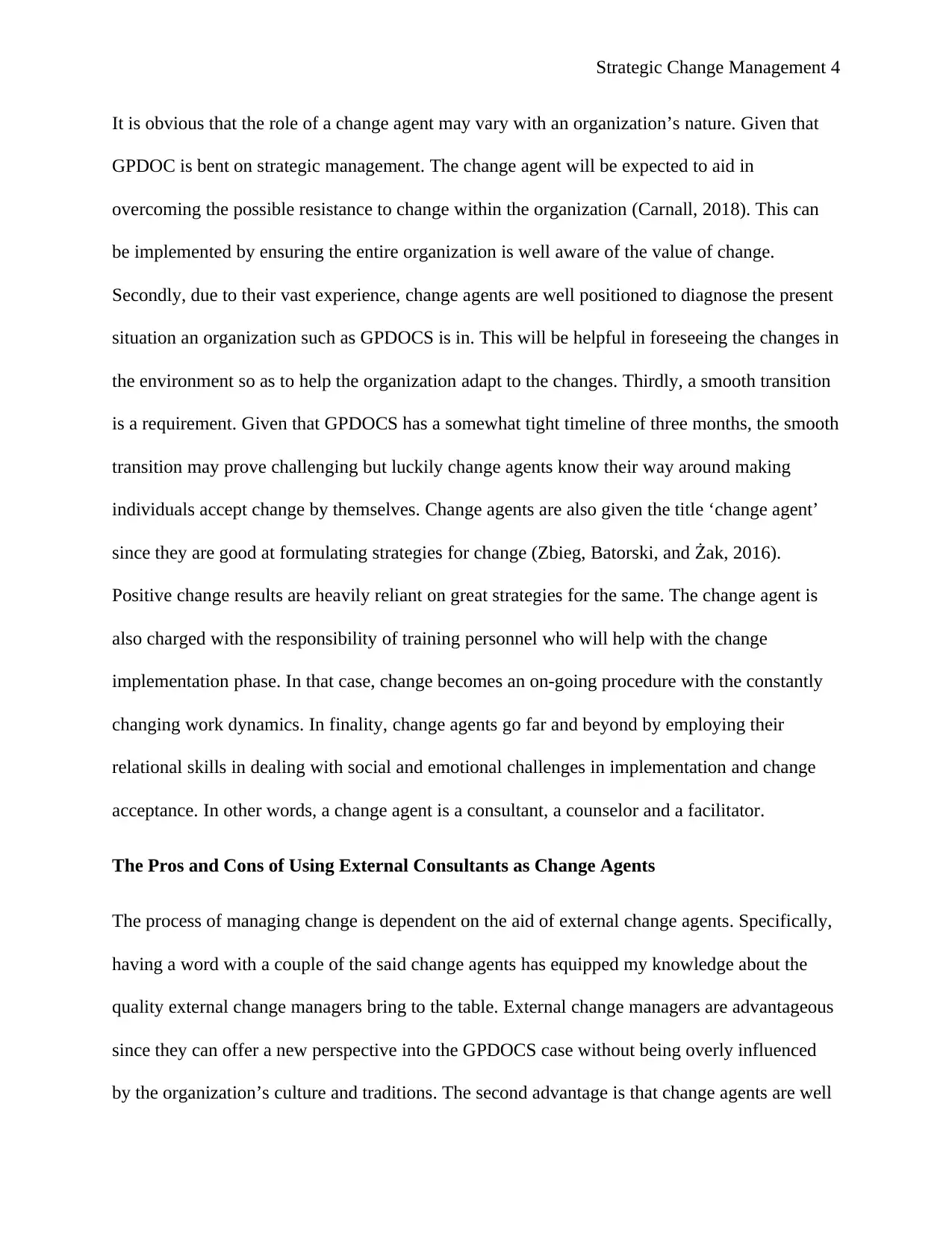
Strategic Change Management 4
It is obvious that the role of a change agent may vary with an organization’s nature. Given that
GPDOC is bent on strategic management. The change agent will be expected to aid in
overcoming the possible resistance to change within the organization (Carnall, 2018). This can
be implemented by ensuring the entire organization is well aware of the value of change.
Secondly, due to their vast experience, change agents are well positioned to diagnose the present
situation an organization such as GPDOCS is in. This will be helpful in foreseeing the changes in
the environment so as to help the organization adapt to the changes. Thirdly, a smooth transition
is a requirement. Given that GPDOCS has a somewhat tight timeline of three months, the smooth
transition may prove challenging but luckily change agents know their way around making
individuals accept change by themselves. Change agents are also given the title ‘change agent’
since they are good at formulating strategies for change (Zbieg, Batorski, and Żak, 2016).
Positive change results are heavily reliant on great strategies for the same. The change agent is
also charged with the responsibility of training personnel who will help with the change
implementation phase. In that case, change becomes an on-going procedure with the constantly
changing work dynamics. In finality, change agents go far and beyond by employing their
relational skills in dealing with social and emotional challenges in implementation and change
acceptance. In other words, a change agent is a consultant, a counselor and a facilitator.
The Pros and Cons of Using External Consultants as Change Agents
The process of managing change is dependent on the aid of external change agents. Specifically,
having a word with a couple of the said change agents has equipped my knowledge about the
quality external change managers bring to the table. External change managers are advantageous
since they can offer a new perspective into the GPDOCS case without being overly influenced
by the organization’s culture and traditions. The second advantage is that change agents are well
It is obvious that the role of a change agent may vary with an organization’s nature. Given that
GPDOC is bent on strategic management. The change agent will be expected to aid in
overcoming the possible resistance to change within the organization (Carnall, 2018). This can
be implemented by ensuring the entire organization is well aware of the value of change.
Secondly, due to their vast experience, change agents are well positioned to diagnose the present
situation an organization such as GPDOCS is in. This will be helpful in foreseeing the changes in
the environment so as to help the organization adapt to the changes. Thirdly, a smooth transition
is a requirement. Given that GPDOCS has a somewhat tight timeline of three months, the smooth
transition may prove challenging but luckily change agents know their way around making
individuals accept change by themselves. Change agents are also given the title ‘change agent’
since they are good at formulating strategies for change (Zbieg, Batorski, and Żak, 2016).
Positive change results are heavily reliant on great strategies for the same. The change agent is
also charged with the responsibility of training personnel who will help with the change
implementation phase. In that case, change becomes an on-going procedure with the constantly
changing work dynamics. In finality, change agents go far and beyond by employing their
relational skills in dealing with social and emotional challenges in implementation and change
acceptance. In other words, a change agent is a consultant, a counselor and a facilitator.
The Pros and Cons of Using External Consultants as Change Agents
The process of managing change is dependent on the aid of external change agents. Specifically,
having a word with a couple of the said change agents has equipped my knowledge about the
quality external change managers bring to the table. External change managers are advantageous
since they can offer a new perspective into the GPDOCS case without being overly influenced
by the organization’s culture and traditions. The second advantage is that change agents are well
Paraphrase This Document
Need a fresh take? Get an instant paraphrase of this document with our AI Paraphraser
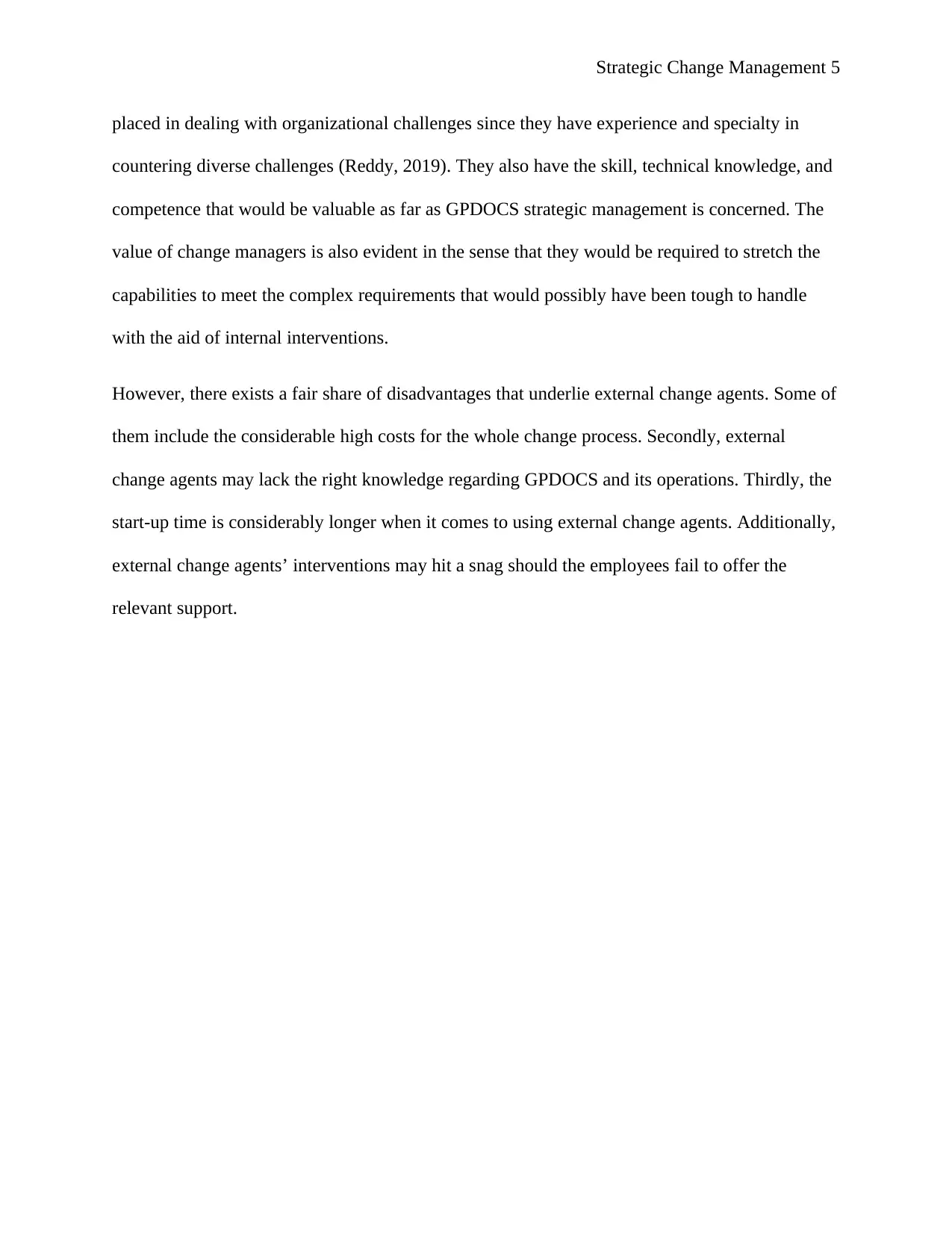
Strategic Change Management 5
placed in dealing with organizational challenges since they have experience and specialty in
countering diverse challenges (Reddy, 2019). They also have the skill, technical knowledge, and
competence that would be valuable as far as GPDOCS strategic management is concerned. The
value of change managers is also evident in the sense that they would be required to stretch the
capabilities to meet the complex requirements that would possibly have been tough to handle
with the aid of internal interventions.
However, there exists a fair share of disadvantages that underlie external change agents. Some of
them include the considerable high costs for the whole change process. Secondly, external
change agents may lack the right knowledge regarding GPDOCS and its operations. Thirdly, the
start-up time is considerably longer when it comes to using external change agents. Additionally,
external change agents’ interventions may hit a snag should the employees fail to offer the
relevant support.
placed in dealing with organizational challenges since they have experience and specialty in
countering diverse challenges (Reddy, 2019). They also have the skill, technical knowledge, and
competence that would be valuable as far as GPDOCS strategic management is concerned. The
value of change managers is also evident in the sense that they would be required to stretch the
capabilities to meet the complex requirements that would possibly have been tough to handle
with the aid of internal interventions.
However, there exists a fair share of disadvantages that underlie external change agents. Some of
them include the considerable high costs for the whole change process. Secondly, external
change agents may lack the right knowledge regarding GPDOCS and its operations. Thirdly, the
start-up time is considerably longer when it comes to using external change agents. Additionally,
external change agents’ interventions may hit a snag should the employees fail to offer the
relevant support.
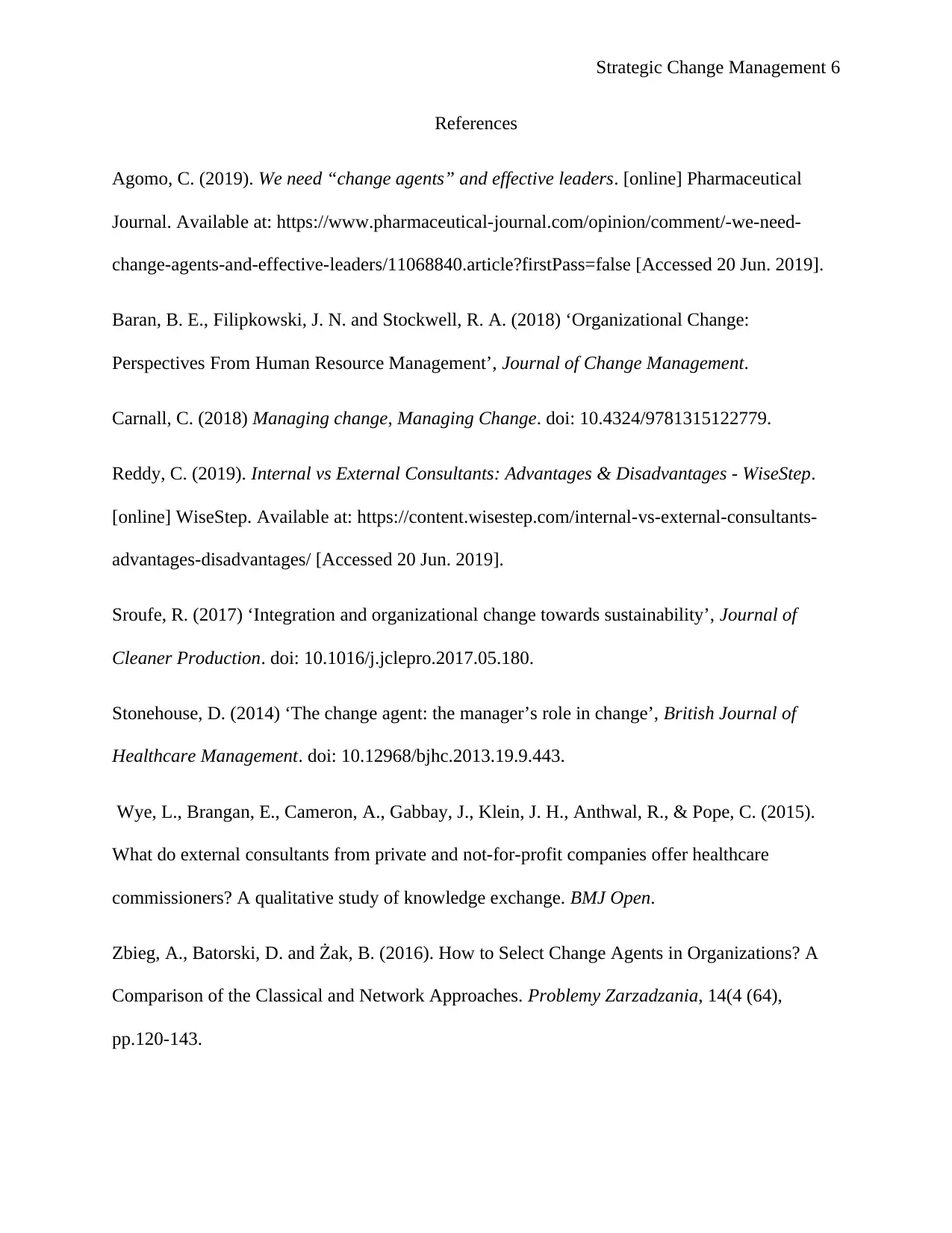
Strategic Change Management 6
References
Agomo, C. (2019). We need “change agents” and effective leaders. [online] Pharmaceutical
Journal. Available at: https://www.pharmaceutical-journal.com/opinion/comment/-we-need-
change-agents-and-effective-leaders/11068840.article?firstPass=false [Accessed 20 Jun. 2019].
Baran, B. E., Filipkowski, J. N. and Stockwell, R. A. (2018) ‘Organizational Change:
Perspectives From Human Resource Management’, Journal of Change Management.
Carnall, C. (2018) Managing change, Managing Change. doi: 10.4324/9781315122779.
Reddy, C. (2019). Internal vs External Consultants: Advantages & Disadvantages - WiseStep.
[online] WiseStep. Available at: https://content.wisestep.com/internal-vs-external-consultants-
advantages-disadvantages/ [Accessed 20 Jun. 2019].
Sroufe, R. (2017) ‘Integration and organizational change towards sustainability’, Journal of
Cleaner Production. doi: 10.1016/j.jclepro.2017.05.180.
Stonehouse, D. (2014) ‘The change agent: the manager’s role in change’, British Journal of
Healthcare Management. doi: 10.12968/bjhc.2013.19.9.443.
Wye, L., Brangan, E., Cameron, A., Gabbay, J., Klein, J. H., Anthwal, R., & Pope, C. (2015).
What do external consultants from private and not-for-profit companies offer healthcare
commissioners? A qualitative study of knowledge exchange. BMJ Open.
Zbieg, A., Batorski, D. and Żak, B. (2016). How to Select Change Agents in Organizations? A
Comparison of the Classical and Network Approaches. Problemy Zarzadzania, 14(4 (64),
pp.120-143.
References
Agomo, C. (2019). We need “change agents” and effective leaders. [online] Pharmaceutical
Journal. Available at: https://www.pharmaceutical-journal.com/opinion/comment/-we-need-
change-agents-and-effective-leaders/11068840.article?firstPass=false [Accessed 20 Jun. 2019].
Baran, B. E., Filipkowski, J. N. and Stockwell, R. A. (2018) ‘Organizational Change:
Perspectives From Human Resource Management’, Journal of Change Management.
Carnall, C. (2018) Managing change, Managing Change. doi: 10.4324/9781315122779.
Reddy, C. (2019). Internal vs External Consultants: Advantages & Disadvantages - WiseStep.
[online] WiseStep. Available at: https://content.wisestep.com/internal-vs-external-consultants-
advantages-disadvantages/ [Accessed 20 Jun. 2019].
Sroufe, R. (2017) ‘Integration and organizational change towards sustainability’, Journal of
Cleaner Production. doi: 10.1016/j.jclepro.2017.05.180.
Stonehouse, D. (2014) ‘The change agent: the manager’s role in change’, British Journal of
Healthcare Management. doi: 10.12968/bjhc.2013.19.9.443.
Wye, L., Brangan, E., Cameron, A., Gabbay, J., Klein, J. H., Anthwal, R., & Pope, C. (2015).
What do external consultants from private and not-for-profit companies offer healthcare
commissioners? A qualitative study of knowledge exchange. BMJ Open.
Zbieg, A., Batorski, D. and Żak, B. (2016). How to Select Change Agents in Organizations? A
Comparison of the Classical and Network Approaches. Problemy Zarzadzania, 14(4 (64),
pp.120-143.
⊘ This is a preview!⊘
Do you want full access?
Subscribe today to unlock all pages.

Trusted by 1+ million students worldwide
1 out of 6
Related Documents
Your All-in-One AI-Powered Toolkit for Academic Success.
+13062052269
info@desklib.com
Available 24*7 on WhatsApp / Email
![[object Object]](/_next/static/media/star-bottom.7253800d.svg)
Unlock your academic potential
Copyright © 2020–2025 A2Z Services. All Rights Reserved. Developed and managed by ZUCOL.




